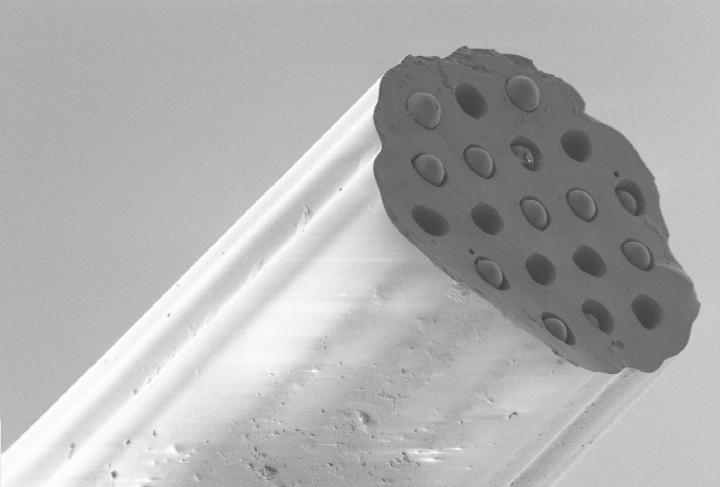Jun 17 2019
Researchers have designed a hair-sized probe that can measure important indicators of tissue damage deep within the lung. The new technology could make way for accurate tracking of tissue in areas where current technologies cannot have easy access.
 This hair-sized probe can measure key indicators of tissue damage deep in the lung. (Image credit: Michael Tanner, Herriot-Watt University and the University of Edinburgh)
This hair-sized probe can measure key indicators of tissue damage deep in the lung. (Image credit: Michael Tanner, Herriot-Watt University and the University of Edinburgh)
Specialists say the probe can capture minute variations in tissue health and could enhance how patients are diagnosed and treated, particularly those on ventilators in intensive care.
Lung diseases are one of the main causes of fatalities and disability in the world. Despite major progress, not much is known about how disease advances in patients suffering from lung injury or pneumonia.
A team of researchers built the probe, which has an optical fiber measuring 0.2 mm in diameter that contains 19 sensors. Each sensor is designed to measure various indicators in tissues such as oxygen and acidity levels, which offer vital information on the reaction of the body to disease processes.
Scientists have engineered the technology to deliver fast, precise measurements and the flexibility to incorporate more sensors. Specialists say the technology is broadly applicable to other areas of the body and could be used to help understand bacterial and inflammatory diseases.
The study was aided by the UK's Engineering and Physical Sciences Research Council (EPSRC) through the support of the Proteus consortium, which includes the Universities of Edinburgh and Bath and Heriot-Watt University. It is reported in Scientific Reports.
Dr Michael Tanner, Proteus Research Fellow at Heriot-Watt University and the University of Edinburgh, said: "This research is a great example of collaboration across disciplines to tackle healthcare challenges. These new methods, if taken to clinic, will lead to novel insights in disease biology. Our aim now is to expand the number of unique sensors on this miniaturised platform to provide even more information."